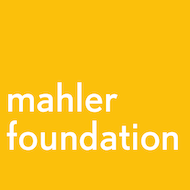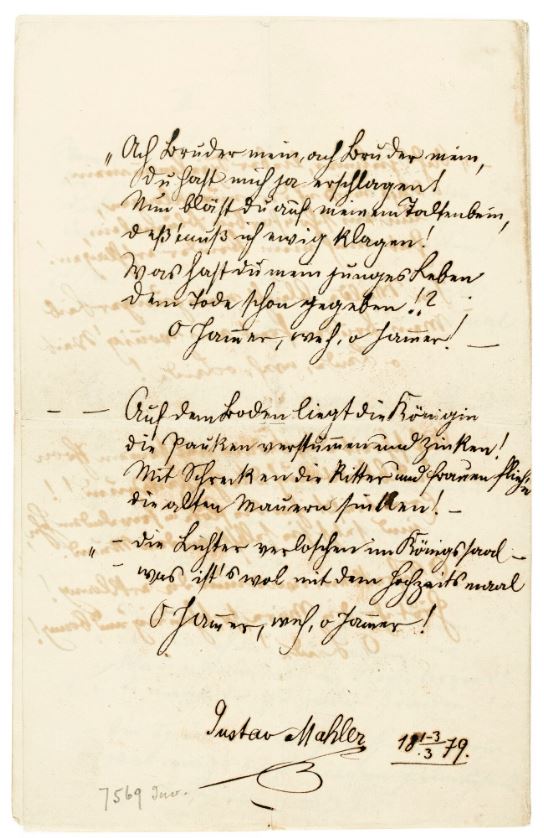Composed
- Year 1880 (original version in three movements).
Performances by Gustav Mahler
- 1901 Concert Vienna 17-02-1901 – Das klagende Lied (Premiere).
- 1902 Concert Vienna 20-01-1902 – Symphony No. 4, Das klagende Lied.
- 1906 Concert Amsterdam 10-03-1906 – Das klagende Lied.
Versions
- Year 1878: 18-03-1878 Text finished.
- Year 1879: 03-03-1879 Letter to Anton Krisper (1858-1914) about ‘Ballade vom blonden und braunen Rittersmann’:
Year 1879. 03-03-1879. Letter by Gustav Mahler (1860-1911) to Anton Krisper (1858-1914) with a draft for the text of the first version of Das klagende Lied; Poem ‘Ballade vom blonden und braunen Rittersmann’.
Comprising three parts, numbered by the composer “I”-“III”, of nine, five and seven stanzas, respectively, with autograph title (“Ballade vom blonden und braunen Rittersmann”), signed and dated at the end (“Gustav Mahler 18.1-3/79.”)
…Vom Felsen hoch erglänzet das Schloß,
die Zinken erschall’n und drommetten,
dort sitzen der Ritter muthiger Troß,
und die Frauen mit goldenen Ketten!
“Was will der jubelnde, fröhliche Schall,
was leuchtet und glänzet im Königssaal
o Freude, heia Freude!”…
- Year 1879: 05-03-1879 Letter to Anton Krisper (1858-1914) about ‘Ballade vom blonden und braunen Rittersmann’:
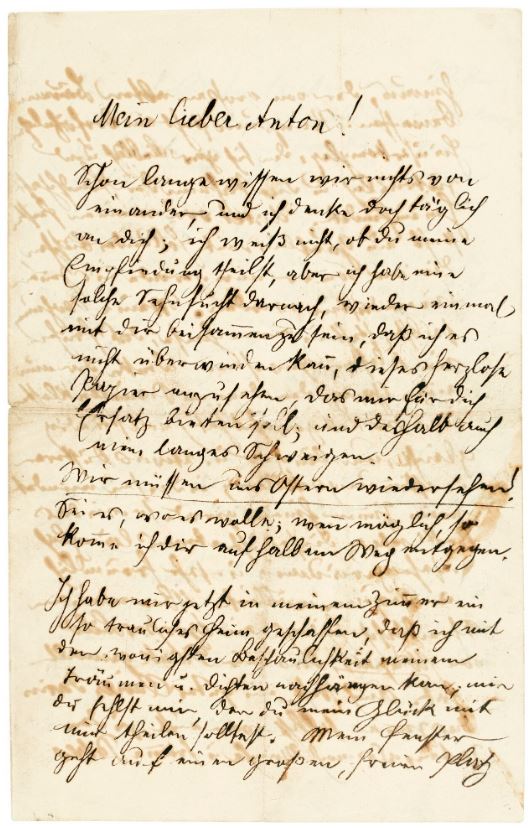
Year 1879. 05-03-1879 Letter by Gustav Mahler (1860-1911) to Anton Krisper (1858-1914) concerning a text source for Das klagende Lied, Poem ‘Ballade vom blonden und braunen Rittersmann’. Lied 1: Waldmarchen (Forest Legend). Libretto Gustav Mahler.
Expressing his longing to see him again, describing in detail his new quarters in a former monastery which he has made into a cosy home for pursuing his dreams and thoughts, mentioning the large painting of Wagner over his desk and the good piano he has there, noting that he [Krisper], the one who should share his happiness with him, is the only thing missing, noting that he can well imagine how happy he is, especially since the monastery-like quiet which hangs about the house contributes a good deal to make his work easy and pleasant; in the second half of the letter Mahler paints the scene of him sitting in an old leather armchair and smoking a fine cigarette, noting that the ballad which he encloses (see preceding lot) was conceived under such circumstances, explaining that he is composing [the ballad] for orchestra, choir and soloists, expressing his hope that his work will be successful, and asking him for his candid opinion on the ballad.
- Year 1880: 21-03-1880 Lied 2: Der Spielmann (The Minstrel) finished.
- Year 1880: 00-10-1880 Lied 3: Hochzeitsstuck (Wedding Piece) finished.
- Year 1880: 01-11-1880 Composition is finished.
- Year 1881: 01-12-1881 Gustav Mahler enters the Ludwig van Beethoven (1770-1827) competition with Das klagende Lied. Members of the jury are Johannes Brahms (1833-1897), Eduard Hanslick (1825-1904), Karl Goldmark (1830-1915) and Hans Richter (1843-1916).
- Year 1881: 15-12-1881 The jury of the Beethoven Prize awards that year’s prize to a piano concerto by Robert Fuchs (1847-1927)‘s rather than to Mahlers’ Das klagende Lied.
- Year 1881: Schott music publishers refused to publish the composition.
- Year 1883: Rejected for the Tonkunstlerversammlung des ADM. See also Franz Liszt (1811-1886).
- Year 1893: 12-1893. First revision of the work took place in the second half of 1893. This featured a significant reduction and re-arrangement of the orchestral and vocal forces, with the number of harps in the first part being reduced from six to two, and the vocal soloists from eleven to four. The boys’ voices were also removed. The offstage orchestra, which had played an important role in the original score, was also completely removed from the second and third parts. In spite of having lavished such detailed effort on revising the work’s first part, Mahler then decided (Autumn 1893) to omit it completely.
- Year 1898: Further revisions to what was now a work in two parts (after the omission of the original first part) were made between September and December. At this point, Mahler’s previous decision to remove the offstage brass was reversed. The revisions were in fact so extensive that Mahler had to write out an entirely new manuscript score.
- Vocal score with piano reduction by Josef von Woss (1863-1943).
- Year 1899: 04-1899. Mahler played Das klagende Lied for Bruno Walter (1876-1962) in the 1897-1898 House Gustav Mahler Vienna – Bartensteingasse No. 3. Walter was deeply impressed.
- Year 1899: 05-1899. Second revision. Without Lied 1: Waldmarchen (Forest Legend).
- Year 1899: 02-07-1899 in Altaussee: Corrects proofs of Das klagende Lied.
- Year 1901: 1901 Concert Vienna 17-02-1901 – Das klagende Lied (Premiere).
- Year 1902: 1902 Concert Vienna 20-01-1902 – Symphony No. 4, Das klagende Lied.
- Year 1902: 09-1902. Published. Weinberger music publishers. Two part version.
- Year 1906: 1906 Concert Amsterdam 10-03-1906 – Das klagende Lied.
- 1934: The score of the original version was preserved and inherited Mahler’s favorite sister Justine (Ernestine) Rose-Mahler (1868-1938) to her son Alfred Eduard Rose (1902-1975).
- 1934: 26-11-1934: World premiere of Lied 1: Waldmarchen (Forest Legend) in Brno. Alfred Eduard Rose (1902-1975).
- 1935: Alfred Eduard Rose (1902-1975) combined the first part with the revised version of the 2nd and 3rd part, which resulted in a mixed version. The rest of the original version, he held back and did not publish.
- 1969: Original version sold to the collector James M. Osburn, who in turn gave it to Yale University.
- 1969: Once the manuscript of the original three-part version came to light in 1969, the earlier score came to be regularly performed and recorded as well.
- 1970: Pierre Boulez recorded the mixed version, including the forest fairy tale.
- 1973: Lied 1: Waldmarchen (Forest Legend) published.
- 1997: Original version published in a critical complete edition by Reinhold Kubik and premiered in the same year under Kent Nagano.
- 1997: German premiere of the original version took place on 28-11-1997 again under the direction of Kent Nagano in the Hamburg Laeiszhalle.
- 1999: Critical edition Lied 1: Waldmarchen (Forest Legend), IGMG/UE.
Movements
- Lied 1: Waldmarchen (Forest Legend). 1899. published 1973. Duration: 28 minutes.
- Lied 2: Der Spielmann (The Minstrel). Duration: 17 minutes.
- Lied 3: Hochzeitsstuck (Wedding Piece). Duration 18 minutes.
- Total duration: 1 hour and 3 minutes.
1881: Rejected for Beethoven Prize
In 1881, Gustav Mahler’s Lied 1: Waldmarchen (Forest Legend) was submitted in a competition for a composition Prize – the Beethoven Prize – sponsored by the Gesellschaft Der Musikfreunde in Vienna. The judges included Johannes Brahms (1833-1897) and Karl Goldmark (1830-1915) and awarded the prize to a work by Robert Fuchs (1847-1927) rather than to Mahler’s cantata.
1883: Rejected for Tonkunstlerversammlung des ADM
Less known is the fact that Mahler in 1883 also submitted Lied 1: Waldmarchen (Forest Legend) to Franz Liszt (1811-1886) for consideration and a possible performance at the festival of the Tonkunstlerversammlung des ADM. Again it was turned down, with the devastating comment that the text of ”Waldmärchen” was not likely to bring the work success.
Year 1883. 13-09-1883. Letter received by Gustav Mahler from Franz Liszt (1811-1886) (in Weimar). Waldmarchen (from Das klagende Lied) is rejected.
Year 1883. 13-09-1883. Letter received by Gustav Mahler from Franz Liszt (1811-1886) (in Weimar). Waldmarchen (from Das klagende Lied) is rejected.
Writing in formal style: Your composition Waldmarchen which you kindly sent to me contains some valuable features. The poem, however, does not seem to be of the kind which would guarantee a success for the composition. (very formal conclusion.) Addressed Kassel. (Origin letter is disputed)
Thus the composition has the distinction of rejection by Mahler’s most outstanding older contemporaries, representing both conservative and radical compositional tendencies of the time. Such rejections may well, as Mahler later claimed, have influenced him to turn to conducting for his livelihood; after them, until 1888, he composed only a handful of songs.
1901 Concert Vienna 17-02-1901 – Das klagende Lied (Premiere).
Publication
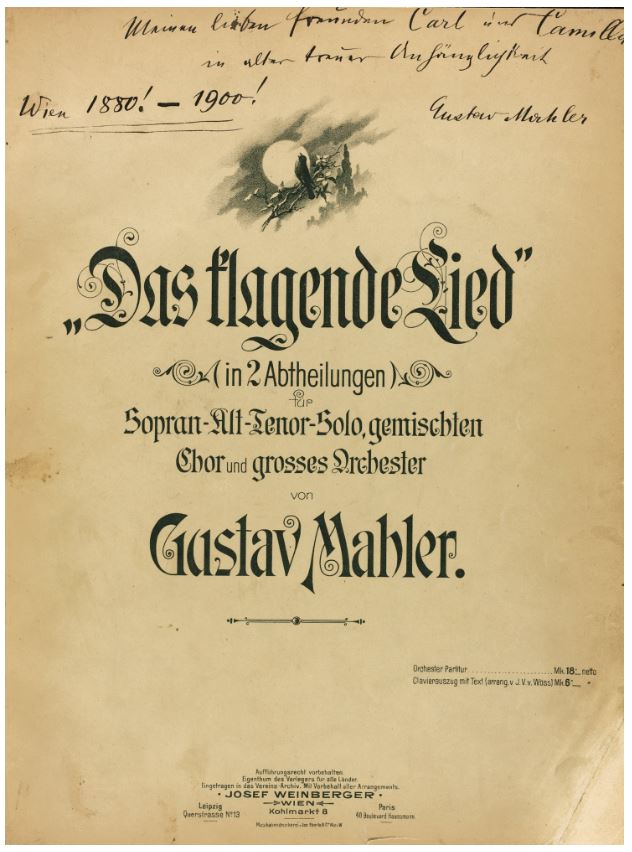
Year 1902. Vocal score of Das klagende Lied, version in two movements, signed and inscribed by Gustav Mahler (1860-1911). The printed wrapper, Vienna: Josef Weinberger, 1902. First edition, 69 pages, publisher’s printed brown wrappers with vignette (also on the title), plate number 25., priced at 6 Marks, early boards, rebacked, the inscription slightly trimmed, small repair to leading lower corners to first 2 leaves. Publisher: Weinberger music publishers.
With personal note by Gustav Mahler: “Meinen lieben Freunden Carl und Camilla in alter treuer Anhänglichkeit Wien 1880!–1900! Gustav Mahler” (in old faithfulness). The dedicatee Camilla Stefanovic-Vilovska (Milla von Ott) was an Austrian violinist (known as “Milla von Ott”).
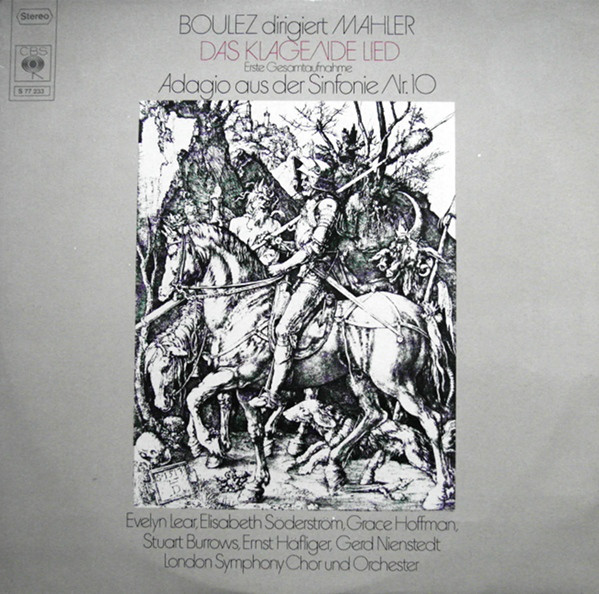
1970. First recording of the version in three movements. Conductor Pierre Boulez.
